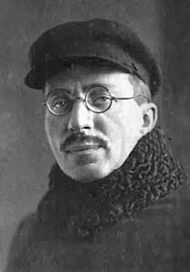- Anton Makarenko
-
Anton Semenovych Makarenko 
Born Антон Семенович Макаренко
January 13, 1888
Bilopillia, Russian EmpireDied April 1, 1939 (aged 51)
Golitsyno, Russian SFSR, Soviet UnionOccupation Educator Ethnicity Ukrainian Citizenship Russian Empire, Soviet Subjects Educational theory, Pedagogy, Correctional education Anton Semenovych Makarenko (Ukrainian: Антон Семенович Макаренко, Russian: Антон Семёнович Макаренко, *1888 – †1939) was a Ukrainian and Soviet educator and writer, who promoted democratic ideas and principles in educational theory and practice. As one of the founders of Soviet pedagogy, he elaborated the theory and methodology of upbringing in self-governing child collectives and introduced the concept of productive labor into the educational system. Makarenko is often reckoned among the world’s great educators, and his books have been published in many countries.[1]
In the aftermath of the Russian Revolution he established self-supporting orphanages for street children - including juvenile delinquents - left orphaned by the Russian Civil War. Among these establishments were the Gorky corrective labor colony and later the Dzerzhinsky labor commune in Kharkiv, where the FED camera was produced.
Although there was some opposition by the authorities at the early stages of Makarenko's "experiments",[2] the Soviet establishment eventually came to hail his colonies as a grand success in communist education and rehabilitation. Among his key ideas were "as much exigence towards the person as possible and as much respect for him as possible", the use of positive peer pressure on the individual by the collective, and institutionalized self-government and self-management of that collective. He also rejected physical punishment.[2]
Makarenko was one of the first Soviet educators to urge that the activities of various educational institutions—i.e., the school, the family, clubs, public organizations, production collectives and the community existing at the place of residence—should be integrated.[1]
Makarenko wrote several books, of which The Pedagogical Poem (Педагогическая поэма), a fictionalized story of the Gorky Colony, was especially popular in the USSR. In 1955 a movie with English title Road to Life was produced.
Like most things Soviet, Makarenko's ideas came under heavy criticism after the fall of communism. His system has been accused of many of the same faults as Soviet Communism in general, such as giving the child collective too much power over the individual child,[3] over-emphasizing discipline and leaving insufficient space for individual freedom.
Notes
- ^ a b Filonov, G. N. (1994) 'Anton Makarenko (1888-1939)', in Prospects: the quarterly review of comparative education UNESCO: International Bureau of Education, Paris. vol. XXIV, no. 1/2, 1994, p. 77-91.
- ^ a b Горкин А. П. (гл. ред.). Российская педагогическая энциклопедия. - М.: Научное издательство "Большая Российская энциклопедия", 1993. Макаренко (Russian)
- ^ Vavokhine, Youri. 2004. The (post)-soviet prison subculture faced with the use of self-management doctrines by the corrections administration. Penal field: new French journal of criminology champpenal.revues.org:
Makarenko is well aware that “more active participation of self-management collectives in the rehabilitation of inmates will result in the increased role of mutual dependency and responsibility, making it necessary for members of the collective to evaluate and influence each other” (ibid, 169). That is precisely his goal...
However, the administration makes the collective free to organize itself, and leaves it the choice of how it reeducates those who lag behind, so that each individual faces the arbitrary action of the collective all alone. He has no latitude to appeal to a higher agency (perhaps more impartial, precisely because it is higher up), the administration. He is punished by his peers, which is quite unfair and intolerable for him. This method therefore elicits some aggressive, antagonistic feelings within the inmate group.
Moreover, formal procedures are never a satisfactory way of handling conflicts between members of the group. To the contrary, conflicts of this type are best solved informally. For this reason, they tend to go partially unseen by the educational and administrative staff, so that we may say that these conflicts between members of an inmate collective are dangerous and difficult to manage.
External links
- Synopsis of Makarenko's book "Road to Life (Pedagogicheskaia poema)
- A profile of Makarenko by Soviet educator G. N. Filonov, published by UNESCO
- Text of "The Road to Life (An Epic of Education)" and "Lectures to Parents" (translated into English)
- Full text of «Pedagogicheskaia poema» (“Road to Life”), without editors deletions, was first published in Moscow, 2003 by Svetlana Nevskaya (Pedagogic museum of A.S.Makarenko). From May 2010 this book accessible via net with permission of A.S.M. Ped. museum administration. It’s late his translation to English and other languages (Rus).
- Makarenko.edu.ru Web-site dedicated to the life, work and creative heritage of A. S. (Russian)
- Critics by Vasily Sukhomlinsky
- A monster of pedagogy
- Dewey and Makarenko
Categories:- Ukrainian educationists
- Soviet educators
- 1888 births
- Russian people of Ukrainian descent
- 1939 deaths
- Ukrainian educators
Wikimedia Foundation. 2010.
